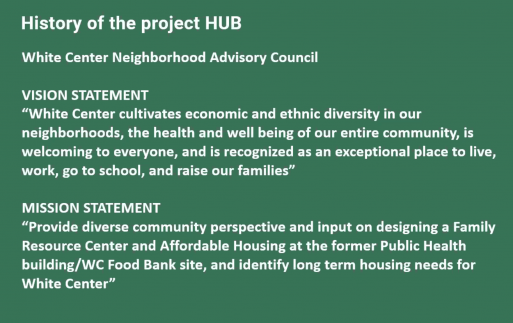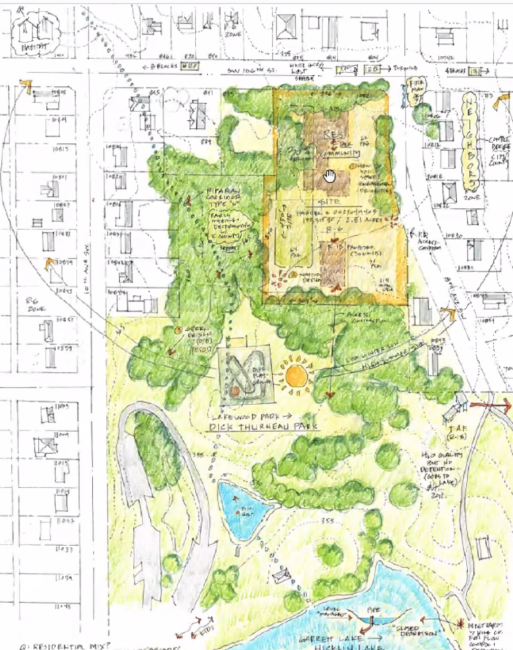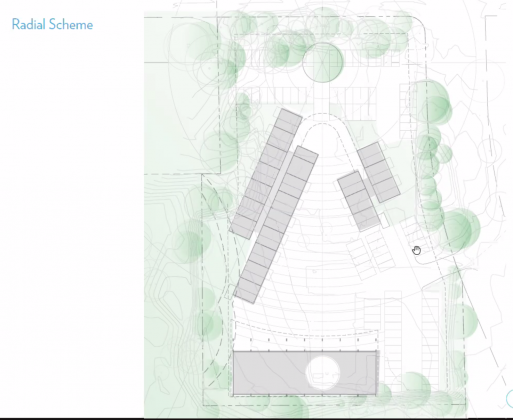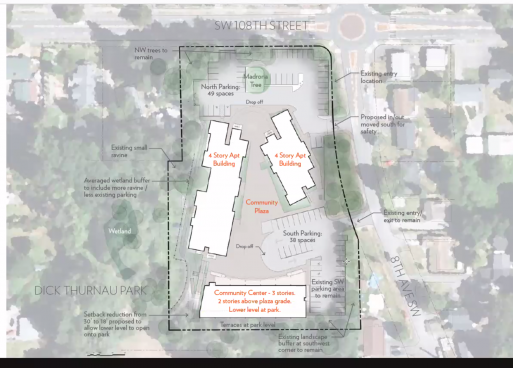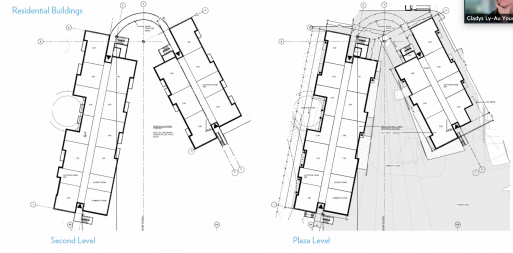From timeline to trees: See newest details of White Center HUB project, and what happens next
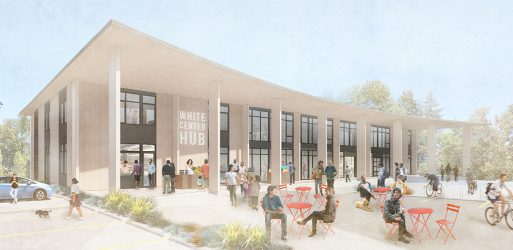 (Rendering by SKL Architects – community-center side of the HUB)
(Rendering by SKL Architects – community-center side of the HUB)
By Tracy Record
White Center Now editor
What’s up with the White Center HUB affordable-housing/community-center project long planned for 8th/108th?
That was answered in an online meeting tonight, facilitated by Aaron Garcia of the White Center Community Development Association, which is leading the project. He began by explaining the inspiration of the project – housing affordability, as well as ‘we’ve heard time and time again we need a place where we can be a community … This project embodies what the community’s been asking for, for years.”
The project’s roots go back about five years. and the 10821 8th SW project – HUB for Hope, Unity, Belonging – has a mission and vision:
A challenge is that the site currently holds White Center Food Bank and a shelter. WCFB was originally a partner but chose not to continue participating and that is why it is seeking a new home. As for the Mary’s Place shelter, the affordable housing in the HUB project will hopefully help address the root cause of homelessness, Garcia said. They are vowing to support the “original owners of the land,” the Duwamish Tribe, too.
The HUB will be WCCDA’s new home, with a commercial kitchen, a child-care center, a hall, and more. Southwest Youth and Family Services, currently headquartered in West Seattle, is a partner; its executive director Steve Daschle spoke about the services SWYFS provides, including education and counseling, resources for immigrants and refugees, New Futures afterschool programming/family support at 5 housing complexes, Becoming a Man groups, a new project in Highline Public Schools, and more. “This is very exciting for us,” Daschle said of the HUB project.
Another partner, the YES Foundation of White Center, whose co-founder Pat Thompson also spoke. This year they’re presenting summer sports camps for ages 6-14, something they’ve done annually (except for last year because of the pandemic); they also present a program for Pacific Islander youth called Our Future Matters, as well as Comida for Central American youth “from all over the Highline school district.” YES Foundation in particular has a partnership with Cascade Middle School that involves a recording studio, and Thompson said one will be built at the HUB for program and wider community use. She called the HUB “a dream come true.”
FEEST Seattle will be a partner too; its executive director Jaimée Marsh explained the food justice and health equity missions of the program, which works with four high schools in the Seattle and Highline districts. Cooking and gathering for dinners is a hallmark of FEEST programming, but it’s expanded into advocacy. The space will enable them not only to host dinners but also to gather for organizing advocacy.
And HealthPoint will provide medical services. HealthPoint’s Eric Dunn said the organization is a network of clinics plus school-based health centers (including one at Evergreen High School). Their clinics offer medical, dental, behavioral health, pharmacy, and more, including naturopathic care.
They’re hoping to have pop-up shop space for local entrepreneurs and a makers’ space at the HUB too.
Next, the housing component of the project: Mason Cavell of Community Roots Housing, which developed Unity Village too, led that presentation. It would have 76 units of affordable housing, from 1 through 4 bedrooms – 14 one-bedrooms, 32 two-bedrooms, 26 three-bedrooms, and 4 four-bedrooms. “We’re trying very hard to offer the deepest levels of affordability” – including units that will be priced from 30% area mean income to 60% area mean income. Solar panels, low-flow water fixtures, and other efficiency features are planned.
Gladys Ly-Au Young from SKL Architects, the project manager, spoke next. She showed the site conditions.
She noted that the site has many big trees. They held some community design sessions about a year ago. That led to a “radial scheme” they’re working with now.
It’s centered on a big madrone tree. They envision a covered “community porch” that could be the site of activities. Here’s the site plan:
She also showed the floor plan for the community center, which would be entered on the second floor, with some larger spaces like classrooms on the first floor, more private spaces like offices on the third floor. It would face onto the park as does the TAF Bethaday Community Space elsewhere in WC. The apartment buildings are shaped in hopes of saving some of the “significant trees” on the site, she said.
Also from SKL, John Kennedy, who said an arborist identified 68 significant trees on site, 5 of which were in poor health and recommended for removal. There is no wetland on the site, he said, but there’s one nearby, a Type 3 wetland, which requires an 80-foot buffer.
Regarding parking, consultant Marni Heffron explained that the strategy will involve sharing parking because the complex’s needs will be in non-overlapping dayparts. It is proposed for 87 parking spaces in all. Larger meetings/events would be recommended for evenings/weekends when staff parking needs would be low. Heffron’s firm also did a traffic analysis and said the project would generate “a pretty modest number of trips compared to what (the nearby roads can) accommodate.” No further intersection improvements would be needed, her study showed. They’ve submitted the studies to King County for review.
TIMELINE/WHAT’S NEXT: Design will be finalized this year. They envision a year and a half of construction, so late 2023 is the current opening projection, if they break ground in spring 2022 as hoped. Getting full funding is an emphasis before then – they have several commitments putting them “over halfway there,” said Garcia, for the HUB building, a 24,000 sf building that’s estimated at $18 million. The housing project is estimated at $30 million. (The housing project was seeking [updated] one recent round of public funding but didn’t make the cut on first try.) They might need bridge funding to get there, but they’re hopeful, Garcia said. A fundraising campaign is under way now. And if you have comments and/or letters of support, HUB@wccda.org is where to send them.
You can follow any responses to this entry through the RSS 2.0 feed. Both comments and pings are currently closed.

